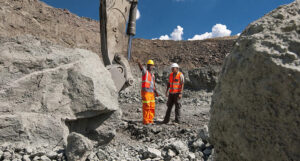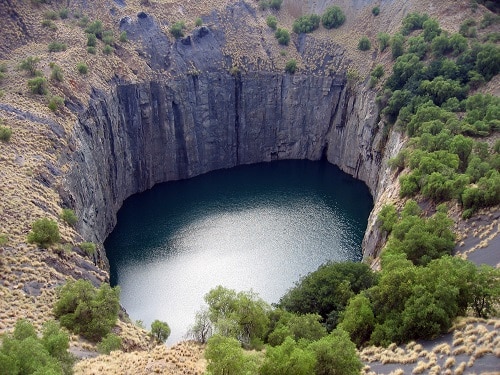Diamond mines in South Africa have been around for more than 150 years. It has been a big part of South Africa’s economy; attracting investors Globally, propelling development, and being a base of employment in the country.
Although diamond mining has placed South Africa high on the investors’ attractive scale, South Africa, like other parts of Africa, has been blessed with an abundance of minerals that has been harnessed and contribute largely to its economy. Hence, South Africa’s modern-day economy has been focused on these mining activities.
If you’re looking to invest in something other than Diamonds, there are several alternatives with as much impact on the South Africa Mine scene.
5 Alternatives to Diamond mining in South Africa
South Africa is home to some of the biggest mines in the world. The mining sector has been a huge contribution to the country’s growth. Every year, the industry adds approximately $13.5 billion to its GDP. Blessed with natural resources with some of the world’s largest reserves, which were discovered as early as the early 1850s, the country has various Industrial-scale mines that show that Diamonds don’t have to be your only friend.
Here are 5 alternatives to Diamond mines in South Africa;
- Gold mines
- Platinum mines
- Coal mines
- Uranium
- Iron ore mines
- Gold Mines
With South Africa being one of the biggest explorers and producers of Gold on the international scene, Gold mining has to arguably top the list. The world’s largest Gold resource, the Witwatersrand Basin, is spread across 3 provinces in South Africa. This is also the first place Gold was found in South Africa in the late 19th century.
Although the second mineral to have been discovered in South Africa, Gold has really integrated and helped sustain development in South Africa over the years. Johannesburg or Egoli (land of Gold) in particular, have been in the middle of this development. Gold mines have also been large contributors to employment, creating approximately 95,130 jobs directly and indirectly.
For many years, South Africa was a primary source of Gold across the world and even though supply and demand largely dictate its value, Gold has never lost its value. Although in recent times, due to economic, environmental, and governance impact, South Africa’s gold production has decreased to 4.2% of global production, generating about 1000 metric tons annually. Despite the covid19 pandemic causing limited mining activities across the world, Gold mines still showed gains from focused investments.
Two of South Africa’s leading Gold mines are the South Deep Gold mine and Mponeng Gold mine.
- Platinum mines
Platinum in South Africa was first discovered in 1924. Hans Merensky followed up on the discoveries and found two deposits now known as the Bushveld Igneous complex. It covers about 100km in length each. And after rounds of successive findings, with 23 new claims, the Merensky reef was established.
Six metals make up the Platinum Group Metals(PGM) and occur in PGM bearing Ore.
Over the years, Platinum has grown immensely and has become a vital part of the industry with ever-increasing demands and new uses. The newest being the platinum catalyst used to increase the octane rating of petroleum. It is also being used in the plastics industry and has its niche in the jewelry industry, with China being a big beneficiary of this, receiving 50% of platinum Jewelry. Platinum is also used in the medical industry, and for industrial applications.
As of 2020, the South African platinum mines still contribute 75% of the world’s production.
Even with the pandemic limiting a lot of industries and mining activities, platinum demand was barely affected.
- Coal Mines
South Africa has been noted to be one of the oldest users of coal dating as far back as the Iron age. However, the coal mining industry didn’t start till the 19th century. South Africa’s coal resources are in the Ecca deposits, largely occupying the north-eastern quarter of the country.
77% of South Africa’s energy is derived from coal, currently, the country’s fossil future is solely dependent on coal. 90% of the coal Africa consumes is produced in South Africa. They produce about 250 million tonnes of coal each year. Coal mines have also impacted hugely on employment, with 92,230 employees, representing about 19% of South Africa’s mining sector overall employment.
South Africa has reserves enough to satisfy its needs for more than a century. There are about 7 important coalfields in South Africa with Richards Bay Coal Terminal (RBCT) serving as the main export port.
- Uranium
The Nuclear Fuels Corporation of South Africa (NUFCOR) started processing uranium as a by-product of gold mining in 1967. The Witwatersrand Basin is also one of the main areas for uranium mining. Uranium can be found in the Krugersdorp and Brakpan regions in Precambrian quartz-pebble composites.
Uranium is said to be 500 times more abundant than gold. It produces a concentrate and 1kg is typically produced from every 1 tonne of ore mined.
Uranium is used for several purposes in the military, and power generation.
The biggest uranium project in Africa is the Ezulweni Project. The project began in 2007 and is run from a mine in Randfontein in the Gauteng province of the country. It outputs roughly 83,969 tonnes every year.
- Iron ore Mines
South Africa is the world’s 6th largest producer of iron ore and 3rd largest exporter. Iron ore is the main ingredient in steel which is used in various applications in the world including structural engineering, manufacturing of cars and ships, and general machinery.
In 2020, the production of iron ore was estimated at 71 million tonnes. Despite the pandemic restrictions, Iron ore saw an increase in revenue which in turn added to the 4% increase of total generated revenue in the industry.
Although there are 21 companies in the Iron ore mining, 70% of South Africa’s Iron ore operation is conducted by Kumba Iron Ore company and they operate three mines, Kolomela and Sishen in the Northern Cape Province and Thabazimbi in the Limpopo Province.
Investing in these South African mines.
Although the Diamond mines in South Africa can be said to be one of the profitable investments in the world, these other mines have remarkable returns irrespective of various economic impacts.
Like every other country’s mining industry, Investing in South Africa’s mining industry has its challenges and risks, especially with the Government’s new policies and regulations, the Broad-based Socio-economic Empowerment charter, requirements, the environmental and economic impact.
- What is the best alternative to Diamond mines in South Africa?
All the mines in South Africa mentioned having their impacts. Depending on the needs, impact on economic value at the time and productivity. These minerals are usually high on demand, as most are used regularly and have sufficient reserves.
For example Gold does not lose its value, it is either sustained or increases, so sometimes its demand and production can be higher than diamond. At other times platinum might be doing better in the mining industry due to demand.
Steps to take if you’re considering investing in South Africa’s Mines.
If you’re thinking about investing in any of the Mines in South Africa but you’re not sure what the right move is, we’ve got you covered. Here are the right steps to take when investing in South African Mines.
- Research
Carrying out research to know which mine to invest in is the right move to make. Look up the various mines, check out their statistics, key figures, the impact of governmental, social, and environmental factors. for example, just like every other sector in the world, mining was affected by the Covid19 pandemic, although this doesn’t mean it won’t be safe. But researching to know risk factors, production, output, sales, and revenue generation will help prepare you and pick the right mine to invest in.
In spite of the Covid19 pandemic, in 2020, platinum, gold, and iron ore were leading the South African mining industry, increasing generated Revenue by 4%. So, looking to invest would have been a good thing. But statistics change and as the world moves forward, demand and production for different minerals also change. It is important not to invest blindly or based on hearsay.
Reach out to investment advisory firms
Researching alone can nearly not be enough, a guide and strategy are necessary. This is where investment advisory firms like Shikana group come in. Shikana group is a trusted guide for business and investment opportunities. They provide advisory services, strategies to help you navigate and regulate market challenges, give practical solutions to drive growth, and manage risk, while upholding your reputation and financial wellbeing, to protect your investment.
Shikana group offers all these by leveraging experience and knowledge on the international markets. Mining is just one of the sectors they cover extensively. They create customized strategies that meet up your needs and eventually result in smooth returns. The best offer has got to be legal aid and representation. Basically, they offer Research plus guided Legal Actions to ensure the protection of their client’s interest. Though stationed in Tanzania, East Africa, their reach is not limited and they can be contacted through their well-detailed website.
South Africa’s mining industry is steadily thriving and has various opportunities for more growth, and this is irrespective of what mine you are interested in… 


Recent Comments